Using proteins from a common tobacco plant virus, McGill chemistry researchers have developed a simple, eco-friendly way to arrange gold nanoparticles into ultrathin sheets, strengthening the particles’ optical properties. The result: cheaper, safer materials for solar panels, sensors and advanced optical devices.


Congratulations to Professor Audrey Moores (Chemistry), who has been awarded the Canadian Pacific Chair in Biotechnology!
The Canadian Pacific Chair in Biotechnology is an endowed chair created in 1984 to promote research in the field of biotechnology. The chair is awarded for a five-year term and rotates among McGill's Faculties of Medicine, Science and Agriculture.

McGill University researchers have developed a novel method to replicate four types of microplastics commonly found in the environment, providing researchers with a standardized approach to study their toxic effects.

An interdisciplinary team of McGill researchers has developed an ultra-strong, environmentally friendly medical glue, or bioadhesive, made from marine waste. The discovery has promising applications for wound care, surgeries, improved drug delivery, wearable devices and medical implants.
“Being able to produce glues that can close wounds or make something strongly adhere to the skin is critical for many medical interventions,” said Audrey Moores, Professor in the Department of Chemistry.
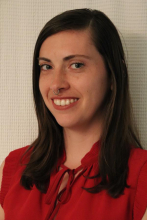
Congratulations to Dr. Alison Bain, who completed her PhD in the Preston Group at McGill in 2021, on being selected for Chemical & Engineering News’s Talented 12 list for 2025. Now an Assistant Professor of Chemistry at Oregon State University, Dr. Bain continues to develop state-of-the-art optical trapping techniques to study aerosols at the single-particle level. Her research centres on how fundamental physical and chemical properties of aerosols shape climate, air quality, and other pressing environmental issues. This honour recognises Dr.

· There are no established protocols for nanoplastic detection within complex environmental matrices.
· Mass spectrometry (MS) analysis of environmental nanoplastics is impeded by methodological constraints.
· Ariya's lab, namely Zi Wang, present a versatile platform evolved from matrix-assisted laser desorption/ionization (MALDI) MS for airborne nano/microplastic research.
· The 3D-printed hollow-laser desorption/ionization (HoLDI) target enables efficient, high-throughput analysis of aerosols collected on simple substrates without pre/post-treatments.

A groundbreaking discovery by McGill University researchers is among the top scientific advances of 2024, according to Québec Science magazine.
The scientists developed a novel method to transform two greenhouse gases—methane and carbon dioxide—into valuable chemicals using sunlight. This innovation could help reduce emissions and provide a more sustainable way to produce certain industrial products.
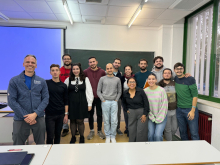
Representing McGill University’s Chemistry Department, the MC² facility, and the QCAM-FRQNT strategic cluster, Petr Fiurasek was honored to be invited to the University of Córdoba to deliver two lectures. One presentation was part of the advanced characterization course for physics master’s students. Beyond the scientific discussions, the visit aimed to foster collaboration between the University of Córdoba and Quebec universities through MITACS and various mobility programs

The Eric McCalla lab's work improving Na-ion battery cathodes has been highlighted in a nice article and video by Patrick de Bellefeuille from MétéoMédia.
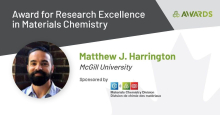
The Award for Research Excellence in Materials Chemistry is presented to a Canadian citizen or landed immigrant who has made an outstanding contribution to materials chemistry while working in Canada. Congratulations to Professor Matthew J. Harrington of McGill University on being the recipient of this award. https://buff.ly/48ZBMhp
Funding to support research on atmospheric aerosol particles and the emergence of life on Earth
Professor Thomas C. Preston -- jointly appointed to the departments of Atmospheric and Oceanic Sciences and Chemistry -- has been awarded a grant of USD$800,000 by the Alfred P. Sloan Foundation. The grant will support Professor Preston’s research on atmospheric aerosol particles, with the goal of advancing understanding of the origin of life's building blocks on early Earth.

Anthropogenic climate change drastically affects our planet, with CO2 being the most critical gaseous driver. Here, we present a fast, effective, and sustainable route for coupling diverse alcohols, amines and amides with CO2 via heterogenization of a natural metal-based homogeneous catalyst through decorating on functionalized graphene oxide. Combined synthetic, experimental, and theoretical studies unravel mechanistic routes to convergent 4‑electron reduction of CO2 under mild conditions.
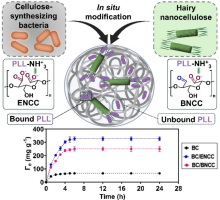
Dr. Seyed Mohammad Amin Ojagh, from Prof. van de Ven's research group and his colleagues, introduced a novel class of highly functionalized nanocellulose-based materials for diverse applications, recently published in the Chemical Engineering Journal. This study involved the in-situ modification of bacterial cellulose (BC) with hairy nanocellulose (HNC), resulting in nanocomposites with enhanced physicochemical properties compared to BC alone.
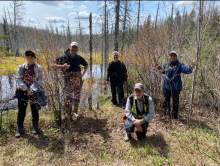
In the heart of Lanaudière, Quebec, a 233-hectare tract of wilderness stands as a living testament to the resilience of nature and the generous stewardship of McGill chemistry professor Linda Reven.

Kudos to Chantal who received the Faculty of Science Excellence award, a testament to her exceptional contributions to our graduate students and department at large over the past 38 years. Chantal's work is multifaceted, and the success of our nowadays well over 230 Graduate Student Population hinges in great part on her relentless work in our department.
